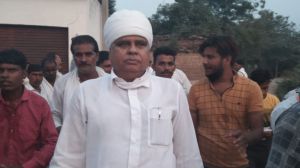Notes from the underground
I am going to give you extensive quotes. The topic justifies them. Here is the first one, which is from the Annual Report of the National Hu...

I am going to give you extensive quotes. The topic justifies them. Here is the first one, which is from the Annual Report of the National Human Rights Commission NHRC, 1999-2000. 8216;A.J. Antony, a resident of Wynad district, Kerala, made a complaint to the Commission alleging that one Hussain, a labourer, was brutally beaten by the police on 19 February 1999 during a raid on a gambling place.
According to the complaint, Hussain had explained to the police that he had gone there to collect money from one Khalid Mohammad and not to gamble. However, the police had ignored his pleas and had beaten him so brutally that his spinal cord broke and he was paralysed from below the neck.
Since his family was not wealthy, he was brought home after the initial treatment. The complainant requested the Commission to recommend action against the guilty police officials and to award a compensation of Rs 6 lakh to the victim.8217;
This is not an isolated quote. I can give you more from the NHRC8217;s Annual Report. I can also give you instances where nothing happened to guilty police officials. There is also a table in the Annual Report, Annexure 17, if you want a precise reference. This tells us that in 1999-2000, there were 177 custodial deaths in police custody, 54 disappearances, 1,157 illegal detentions/arrests and 1,647 false implications 8212; 5783 8216;other police excesses8217; are separate. In general, these crimes are concentrated in Bihar, UP and Delhi. This is generally known and is not new.
What is new is the Justice Malimath Committee. More accurately, this is a Committee on Reforms of Criminal Justice System, set up by home ministry and due to submit its report in early 2003. Of course, the criminal justice system is in a mess. People who are in jail should be outside and people who are outside should be in jail.
Of course, reform is needed. Why should there be 2.8 million undertrials in a total jail population of 3.8 million? Why should 97 per cent of those in jail be people accused of petty crimes, who are awaiting trial for terms that are longer than the maximum imprisonment prescribed for those alleged crimes? Why should the rate of prosecution be so low and why should the rate of conviction be lower still? The reform argument is fine and the Justice Malimath Committee has administered questionnaires to various people. Issues covered in this questionnaire include the adversarial system and right of silence, burden of proof, plea-bargaining and compounding, sentences, victim participation and compensation, trial, investigation, prosecution and federal serious crimes. These are weighty matters and deserve several columns.
I want to only focus on investigation. Even investigation deserves several columns. I want to focus on only one aspect, questions 7.13 through 7.18 of the Malimath Committee8217;s questionnaire. Here they are. 8216;In order to improve the credibility of the statements of witnesses recorded during investigation, under Section 162 CrPC, do you favour their being read over and signed by the witnesses? Do you favour the recording of statements under Section 162 CrPC, being done by officers of higher ranks such as DSP, and above, to ensure fairness in recording? Do you favour video-recording of all statements of witnesses, suspects, the accused and others during investigation as a measure of ensuring that the statements recorded are voluntary and accurate? Do you think that the statements recorded by the police during investigation should be rendered admissible in evidence? If yes, what statutory amendments do you suggest? Do you favour the confessional statements made by the accused during investigation being videorecorded in the presence of an officer not below the rank of DSP? If yes, what statutory amendments do you suggest for rendering such confessional statements admissible in evidence?
That8217;s more or less the gist of it, the most important part being confessional statements by the accused. Here is what Section 162 of the CrPC has to say: 8216;No statement made by any person to a police officer in the course of an investigation under this Chapter shall, if reduced to writing, be signed by the person making it; nor shall any such statement or any record thereof, whether in a police diary or otherwise, or any part of such statement or record, be used for any purpose, save as hereinafter provided, at any inquiry or trial in respect of any offence under investigation at the time when such statement was recorded.8217;
The 8216;hereinafter8217; is about statements made by witnesses. As I have said, I am more concerned about statements made by suspects. Depending on what recommendations the Malimath Committee makes, this Section 162 of CrPC will be changed. And so will Sections 25 and 26 of the Indian Evidence Act.
There is a general sense that India is a soft state. We must give more powers to the police and the army. Look at the United States. Look at Israel. Governance will not improve until India becomes a hard state. What is the point of the police recording confessions if these are not going to be admissible in court?
If there is video recording and if we ensure that confessions are made in the presence of police officers above a certain rank, what is wrong? Incidentally, you will also find such suggestions in Reports of the National Police Commission 1979-81, especially the Fourth Report, submitted in June 1980.
This worries me. It should worry you also. Increasingly, we are enamoured of all things American. There is one good thing about the US system though 8212; availability of information. Try a Net search on Innocence Projects. There are several of these.
You will find that people who have been convicted through confessions have subsequently been found to be innocent. After they have served years in prison, or after they have faced death sentences. You will find that video recording doesn8217;t help. You will find that even without third degree, people who are innocent tend to confess. You will find the rank of the investigating officer doesn8217;t help. I am not that enamoured of such hard states.
- 01
- 02
- 03
- 04
- 05































